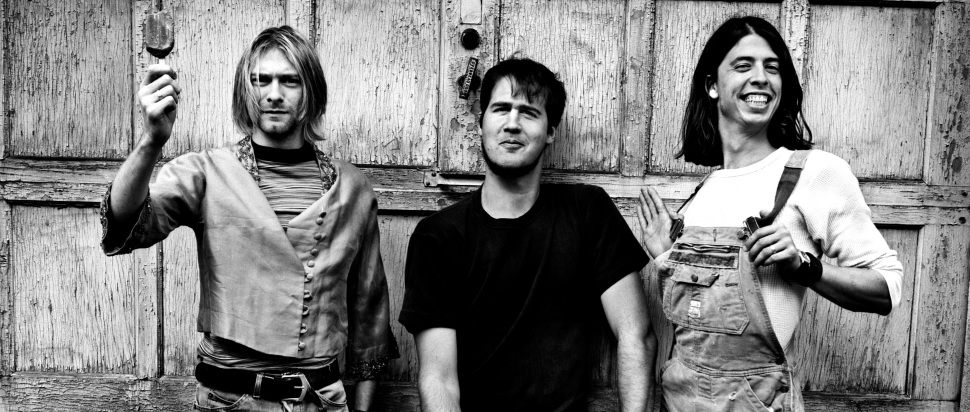Celebrating 30 Years of Nirvana's In Utero
As Nirvana's In Utero celebrates its 30th anniversary, we look back on the album's importance and how its influence extends to bands and artists today
'Teenage angst has paid off well, now I’m bored and old'.
With the first lyrics sung on In Utero, Kurt Cobain told the world they weren’t getting Nevermind II. It's been 30 years since Nirvana released In Utero, their third and final studio album. An undoubted commercial success at the time, reaching the number one position on both the US Billboard and UK Album charts, it ultimately went on to sell over 15 million copies worldwide. It is an album with an enduring legacy.
Nirvana changed the world overnight in September of 1991 when they released the genre- and musical epoch-defining surprise hit Nevermind. Led by Smells Like Teen Spirit, Come As You Are and Lithium, the three-piece brought the burgeoning Seattle rock scene and sound, which would later be known as grunge, firmly into the public consciousness. The Pacific Northwest became a hotbed for alternative music, and bands like Alice in Chains, Soundgarden and Pearl Jam similarly experienced a wave of mainstream popularity.
Following up such a successful album was never going to be an easy task, and Nirvana sought to defy expectations by purposefully adopting a less commercially-friendly sound on In Utero. The band sought out producer Steve Albini, who had previously worked with artists including Pixies, PJ Harvey and The Breeders, to help them create a record that was raw and noisy. Gone are the obvious pop sensibilities and influences from Nevermind, replaced by a more visceral and primal sound.
Tracks like Scentless Apprentice, Very Ape and Rape Me (a song that Cobain had to clarify multiple times as being explicitly anti-sexual assault) are by design challenging listens, full of harsh dissonant chords and guttural screaming. Radio Friendly Unit Shifter is the most obvious piece of commentary on the album, with its high-pitched squeals and unsettling feedback serving as a direct middle-finger to what studio executives expected of them, and to purposefully commercial rock music. There are times that listening to In Utero feels like a full-frontal assault on the ears, but there are also moments of surprising tenderness. Closing track All Apologies is a searingly beautiful and understated departure in sound, with Cobain’s vocals restrained and underscored by a cello accompaniment.
In the years since In Utero’s release, tracks from the record have been covered by countless artists from a variety of genres, further testament to Cobain’s supreme abilities as a songwriter. Pop artists including Lana Del Rey and Post Malone have played songs from the record live in concert; Sinéad O’Connor included a gorgeous barebones cover of All Apologies on her 1994 album Universal Mother; an orchestral rendition of Heart-Shaped Box composed by Ramin Djawadi featured prominently in the soundtrack for the HBO show Westworld. To call In Utero influential is to do it a disservice, it is Nirvana’s magnum opus.
The album’s impact and influence also spread across the Atlantic, causing aspiring rock stars in Britain to pick up instruments and start creating art of their own. Biffy Clyro, Mogwai, Muse, Feeder, Arctic Monkeys and Twin Atlantic are among the British acts that have acknowledged Nirvana as having had a significant influence on their own music, as well as newer bands like Swim School, Dead Pony and Hot Wax. We spoke to a trio of Scottish musicians to find out how Nirvana and In Utero has impacted their lives and artistry.
Twin Atlantic’s Sam McTrusty
“In Utero was less of a record to me and more of a bible, something that I studied religiously. Every song I’ve ever written I’ve tried to emulate not just Kurt Cobain, but the way they approached their music. Why have they put that harmony in there? What’s the relationship between Dave Grohl’s drums and the bassline?
“I’ve not just been a fan, but also a student, and then even a bit of an obsessive, and In Utero has served as a template for me for how to approach recording an album.”
Mogwai’s Stuart Braithwaite
“I was a huge fan of Bleach, and I saw Nirvana three times in '91 around the release of Nevermind, so I remember the kind of genesis of that time, when they really blew up and you started hearing that style of music on the radio. It was funny because I was a skater and I wore these cheap clothes, because it didn’t matter if I fell over, and for about three months I was extremely fashionable. Their music was so authentic and real, and I think that’s why people still idolise them.”
Dead Pony’s Blair Crichton
“Nirvana have definitely had an influence over our music and our approach to creating art. They paved the way for a whole new movement of bands and style that can still be felt today. Nirvana's simple, tasteful chord progressions and interesting note choices are something that has moulded the way we sound as a band – we are obsessed with trying to make music that is catchy and infectious while still being original and subversive.”
Thirty years on, In Utero has stood the test of time and remains the pinnacle of Nirvana’s discography. We can only wonder what they would have done next.
In Utero was originally released on 21 Sep 1993; a special 30th anniversary multi-format reissue was released on 27 Oct, available here
